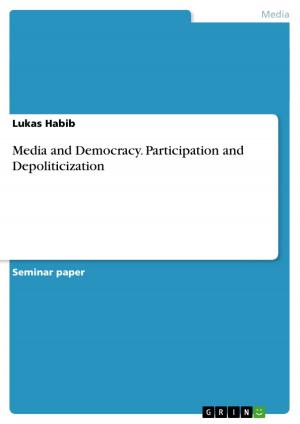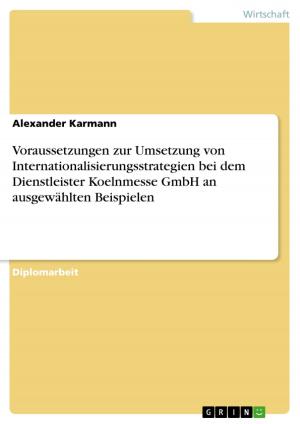| Author: | Derya Ünal | ISBN: | 9783656413844 |
| Publisher: | GRIN Verlag | Publication: | April 18, 2013 |
| Imprint: | GRIN Verlag | Language: | English |
| Author: | Derya Ünal |
| ISBN: | 9783656413844 |
| Publisher: | GRIN Verlag |
| Publication: | April 18, 2013 |
| Imprint: | GRIN Verlag |
| Language: | English |
Seminar paper from the year 2013 in the subject History - World History - Modern History, grade: 6.0, University of Basel, course: The British Empire, language: English, abstract: From the beginning, British trade with China was restricted to confinements in Canton, as the Qing Emperors saw the foreign intruders as a potential threat and were keen on keeping the foreigners beyond their borders and under tight control. This relationship between the two Empires only changed at the beginning of the 19th century when the British decided to renew their trade interests in the Far East. The following time was then characterized by an increase of diplomatic efforts between the expansionist British and the reluctant Qing Emperors, which was eventually disrupted by war. In this paper, I want to analyse the development of the British political and economic relations to China, during the period of time in 1793 - 1860. This period was chosen as it marked a turning point in the Anglo-Chinese relations, causing events that immensely affected the histories of both Empires to come, and leading to the rise of one, and the downfall of the other. The year 1793 witnessed the journey of the Macartney Embassy to the court of the Qing Emperor, which was the first renewed attempt to secure trade concessions for the unsatisfied East India Company. This first diplomatic act was bound to failure due to the fundamental differences in cultural self-conception. The subsequent events demonstrate the continuation of failed awareness from two Empires each seeing themselves as the centre of the world. In this way, the tensions during this time between the powers were also influenced by the change from a cultural to an economic clash, exposing the interests of both nations in the conflict. The failure of diplomatic measurements is of particular interest in this case, as they gave rise to the catastrophic events of the two Opium Wars. In order to understand this process, I will focus on the employed strategies and policies by the British to reach their goals of opening China to trade. Further, the aim is to provide an evaluation of both countries' motivations during the Opium Wars, so as to understand why the British employed different and increasingly pushing tactics, or why the Qing Emperors goals were dissimilar to such an extent. The year 1860 was chosen as the end of this period, as it saw the destruction of the Imperial summer palace by the British as retaliation for their tortured ambassadors, and can be seen as a symbol for the disastrous consequences the conflict had on both sides.
2010-2013 BA History and English, University of Basel
Seminar paper from the year 2013 in the subject History - World History - Modern History, grade: 6.0, University of Basel, course: The British Empire, language: English, abstract: From the beginning, British trade with China was restricted to confinements in Canton, as the Qing Emperors saw the foreign intruders as a potential threat and were keen on keeping the foreigners beyond their borders and under tight control. This relationship between the two Empires only changed at the beginning of the 19th century when the British decided to renew their trade interests in the Far East. The following time was then characterized by an increase of diplomatic efforts between the expansionist British and the reluctant Qing Emperors, which was eventually disrupted by war. In this paper, I want to analyse the development of the British political and economic relations to China, during the period of time in 1793 - 1860. This period was chosen as it marked a turning point in the Anglo-Chinese relations, causing events that immensely affected the histories of both Empires to come, and leading to the rise of one, and the downfall of the other. The year 1793 witnessed the journey of the Macartney Embassy to the court of the Qing Emperor, which was the first renewed attempt to secure trade concessions for the unsatisfied East India Company. This first diplomatic act was bound to failure due to the fundamental differences in cultural self-conception. The subsequent events demonstrate the continuation of failed awareness from two Empires each seeing themselves as the centre of the world. In this way, the tensions during this time between the powers were also influenced by the change from a cultural to an economic clash, exposing the interests of both nations in the conflict. The failure of diplomatic measurements is of particular interest in this case, as they gave rise to the catastrophic events of the two Opium Wars. In order to understand this process, I will focus on the employed strategies and policies by the British to reach their goals of opening China to trade. Further, the aim is to provide an evaluation of both countries' motivations during the Opium Wars, so as to understand why the British employed different and increasingly pushing tactics, or why the Qing Emperors goals were dissimilar to such an extent. The year 1860 was chosen as the end of this period, as it saw the destruction of the Imperial summer palace by the British as retaliation for their tortured ambassadors, and can be seen as a symbol for the disastrous consequences the conflict had on both sides.
2010-2013 BA History and English, University of Basel















